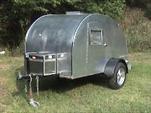12v car fuse box?
8 posts
• Page 1 of 1
12v car fuse box?
Im planning now, To start building my tear in the spring, Im in Canada and I'm building outside so it gets cold(Understatement) LOL. But my question pertains to using a automotive fuse box? Could I, There would be more than enough fuses/recepticles. And use car audio style cables for the battery and main fuse,like run 4Gauge positive from the car after the solinoide to my trailer, then a Main switch, Then a 60amp AGU style car audio fuse through 4Gauge to the car fuse box in my raceway? And likewise run 4Gauge ground from my TV to my TD battery? then 4Gauge to the car audio style grounding bolck? And lastly how would I add a amp and volt meter? Thanks for the help.
“You know that other party, who said he saw something, that we know did not happen? He realizes now, he didn't see what we know did not happen...â€
- ssj4jarrod
- Teardrop Builder
- Posts: 25
- Joined: Mon Nov 02, 2009 10:13 am
- Location: Winnipeg, Manitoba
This is what I used. It is designed to be an add on fuse box that is ignition switched. I just wired a toggle switch in place of an ignition switch, this switchs the power on and off via a relay.
http://www.painlessperformance.com/webcatalog/largeview.php?SearchField=70117
No problems yet.
http://www.painlessperformance.com/webcatalog/largeview.php?SearchField=70117
No problems yet.
If I could shut my brain off, I could save myself alot of time, money and effort.
-

Aaron Coffee - 1000 Club

- Posts: 1003
- Images: 26
- Joined: Thu Jun 30, 2005 4:40 pm
- Location: Elk Point, SD
 Quick Question: Just how much power do you need in your TD? If I read this right you are trying to run 3 batteries???
Quick Question: Just how much power do you need in your TD? If I read this right you are trying to run 3 batteries???



